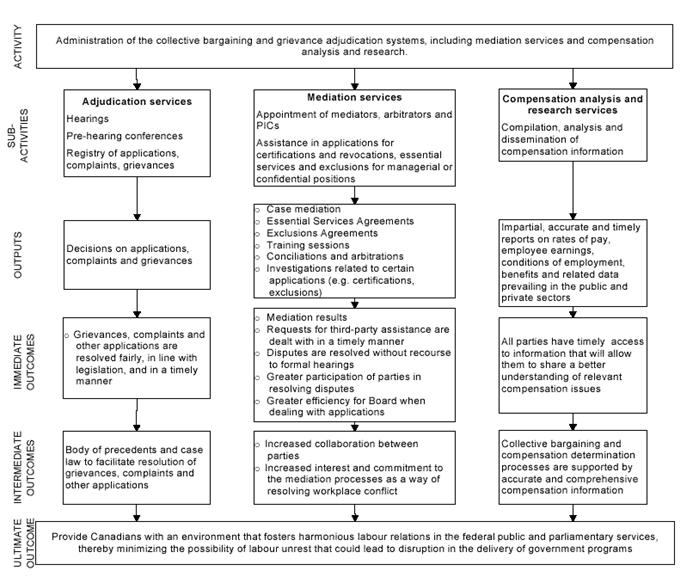Common menu bar links
Breadcrumb Trail
ARCHIVED - RPP 2007-2008
Public Service Labour Relations Board
 This page has been archived.
This page has been archived.
Archived Content
Information identified as archived on the Web is for reference, research or recordkeeping purposes. It has not been altered or updated after the date of archiving. Web pages that are archived on the Web are not subject to the Government of Canada Web Standards. As per the Communications Policy of the Government of Canada, you can request alternate formats on the "Contact Us" page.
SECTION II: ANALYSIS OF PROGRAM ACTIVITY BY STRATEGIC OUTCOME
Description of Program Activity
The Board has one key program activity: to administer the collective bargaining and grievance adjudication systems in the federal public service and the parliamentary service, including mediation and compensation analysis and research. By carrying out this activity, the Board’s ultimate strategic outcome is to provide Canadians with an environment that fosters harmonious labour relations in the federal public service and parliamentary service, thereby minimizing the possibility of labour unrest that could lead to disruption in the delivery of government programs.
The Board provides three main areas of service: adjudication services, mediation services and compensation analysis and research services.
Adjudication services
The Board and adjudicators of the Board hear and determine grievances, complaints and labour relations matters brought before them under the PSLRA and the PESRA.
Board members hold grievance adjudication and complaint hearings throughout Canada. Adjudication cases consist of individual, group or policy grievances arising from the application or interpretation of collective agreements or arbitral awards, or individual grievances arising from disciplinary actions that have a financial implication, or from termination. The Board’s mandate includes grievances in which human rights discrimination is an aspect of the case, except for those related to pay equity.
The Board handles other labour relations proceedings including applications for certification, revocation of certification, displacement, complaints of unfair labour practices, identification of positions whose duties are of a managerial and confidential nature, essential services agreements, determination of successor rights, enforcement of obligations of employer and employee organizations, and complaints of reprisals that result from federal employees having exercised their rights relating to workplace health and safety under Part II of the Canada Labour Code.
Mediation services
The Board provides a range of mediation services, which include:
assisting parties through conciliation and arbitration in the negotiation and renewal of collective agreements;
assisting parties in handling issues arising from the implementation of collective agreements;
helping parties work together to resolve grievances and complaints and thus avoid a formal adjudication hearing.
The Board offers a two-and-a-half day interactive training session at the national level on interest-based negotiations and mediation, which is geared specifically to labour relations in the federal public service. The high demand for such training, along with the joint union-management approach used, makes this training program a unique and critical activity for the Board’s clients.
Compensation analysis and research services
The Board is charged with establishing and delivering a compensation analysis and research function that will generate compensation data to be used by parties engaged in the collective bargaining and compensation determination processes in the federal public service as well as by other public and private organizations and individuals.
Other services
As required by the PSLRA, the Board provides physical and administrative support services to the National Joint Council (NJC), an independent consultative body of employer and employee representatives. The NJC exists to determine public service-wide issues that do not lend themselves to unit-by-unit bargaining. The Board houses the NJC but plays no direct role in its operation.
Under an agreement with the Yukon government, the Board administers the collective bargaining and grievance adjudication systems under the Yukon Education Labour Relations Act and the Yukon Public Service Labour Relations Act. When performing these functions funded by the Yukon government, the Board acts as the Yukon Teachers Labour Relations Board and the Yukon Public Service Labour Relations Board, respectively.
The following chart illustrates the links between the Board’s main program activity and sub-activities and their expected results for Canadians:

The Board is in the process of developing and establishing a performance measurement framework adapted to its realities and those of its clients. For example, the expeditious handling of proceedings referred to the Board has always been and remains a priority. However, the increase in the volume and complexity of cases, along with capacity issues of the parties in dealing with such increases, calls for a re-evaluation of performance standards to make them more realistic and achievable for all concerned. The Board also seeks to produce more performance information on a more regular basis, not only for reporting purposes, but, more importantly, to support decision making.
For the Board, the satisfaction of clients, timeliness of processes, quality of decisions and success of mediation services will continue to be part of the indicators used to measure performance. Indicators will also be introduced related to the compensation information that is collected, analyzed and made available, and to the Board’s internal services.
The Board’s case management system, which records data on all types of cases and their progress through the system, is a key source of data for performance measurement. Other data sources include statistics on cases submitted for Judicial Review, the Board’s client satisfaction survey, which is administered every three years and uses common questions that allow responses to be tracked through time, and other formal and informal consultations with clients to obtain regular feedback. A survey of client satisfaction will be conducted in 2007-2008.
